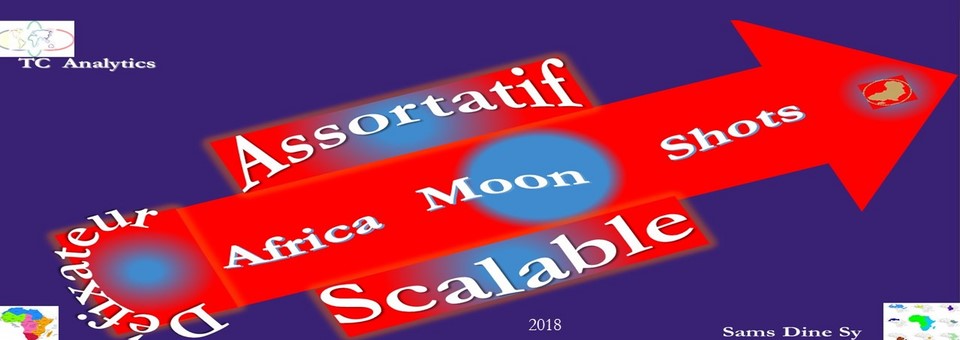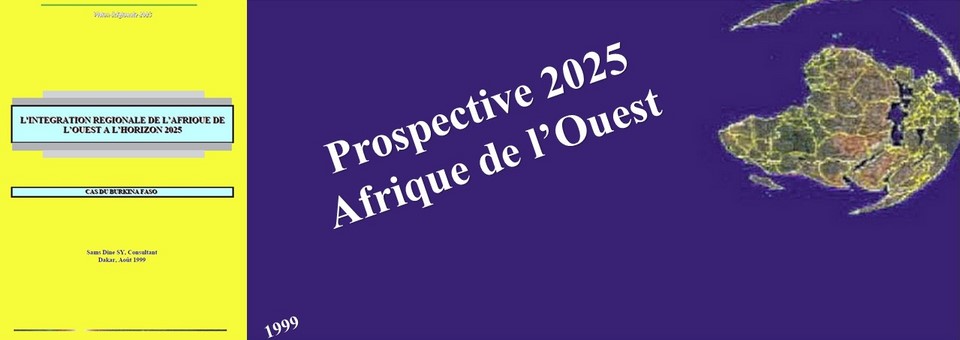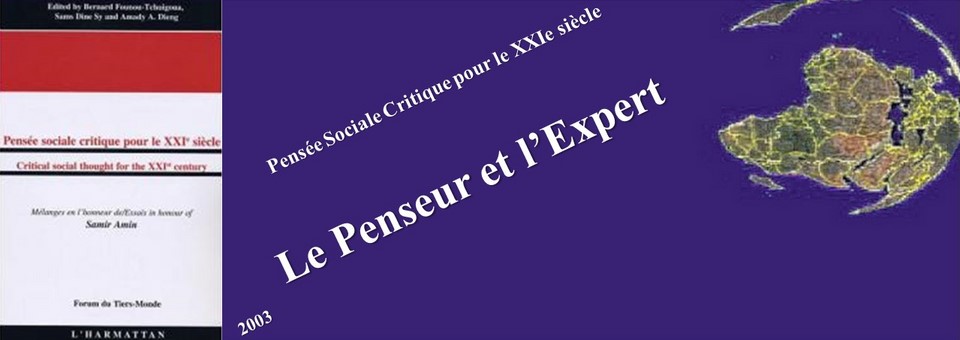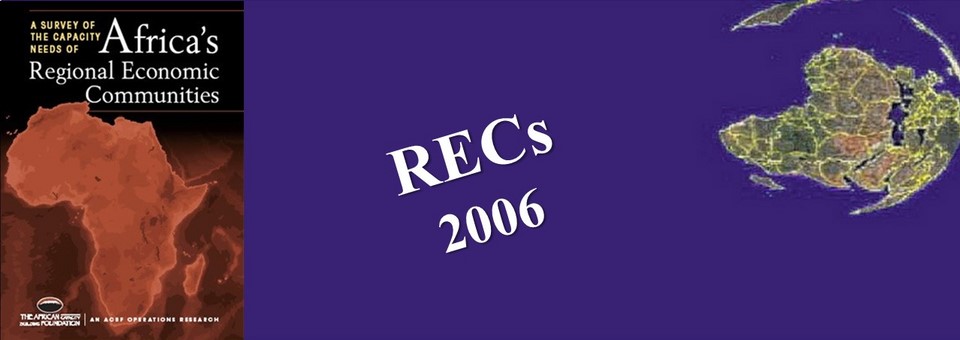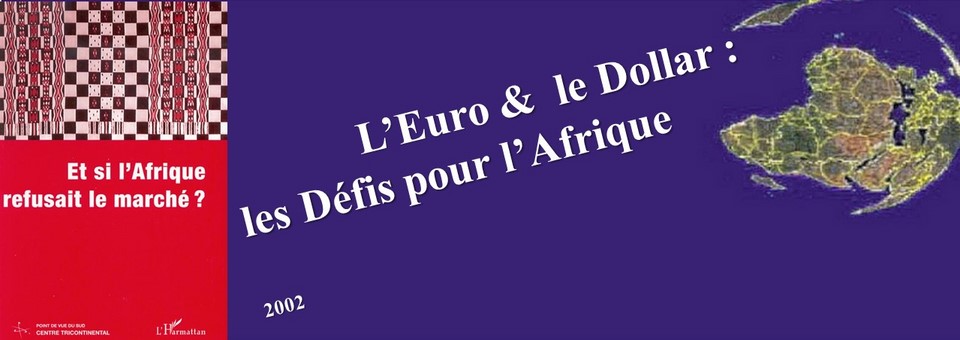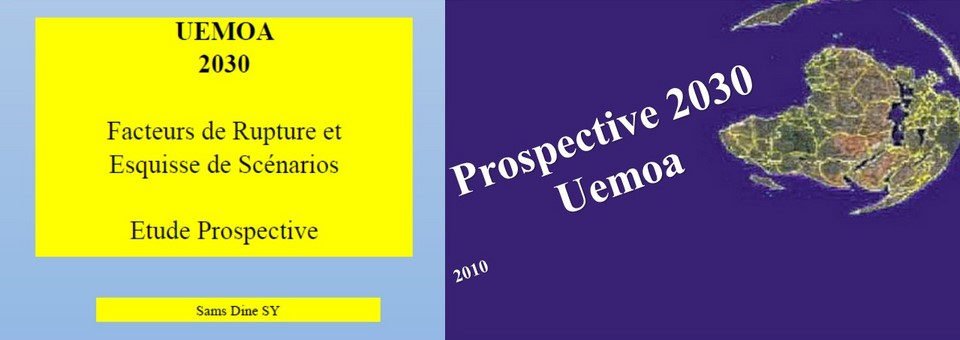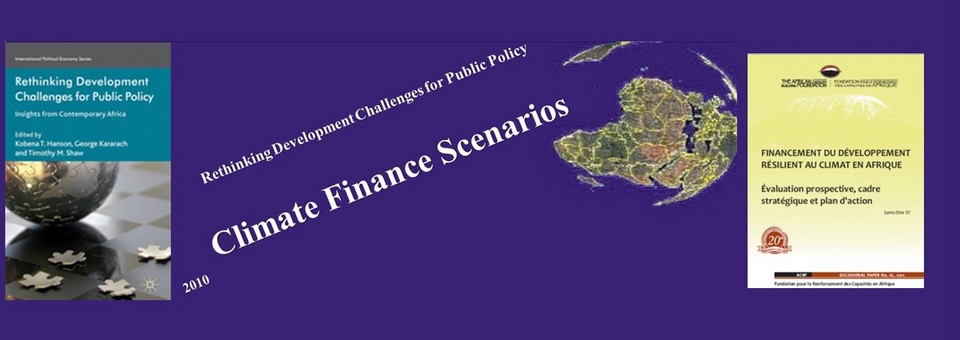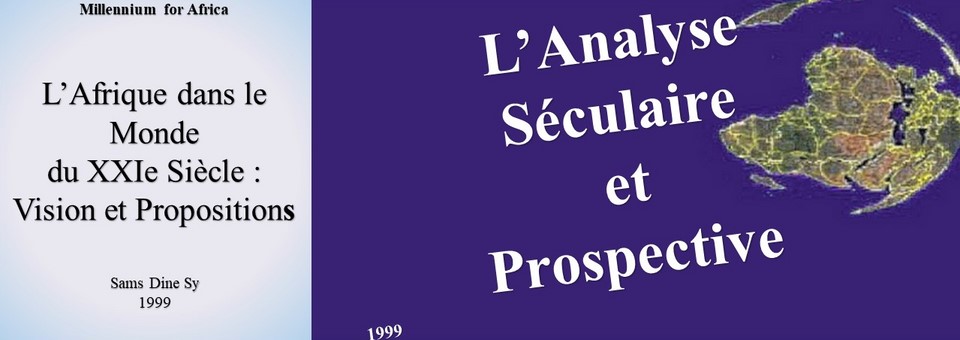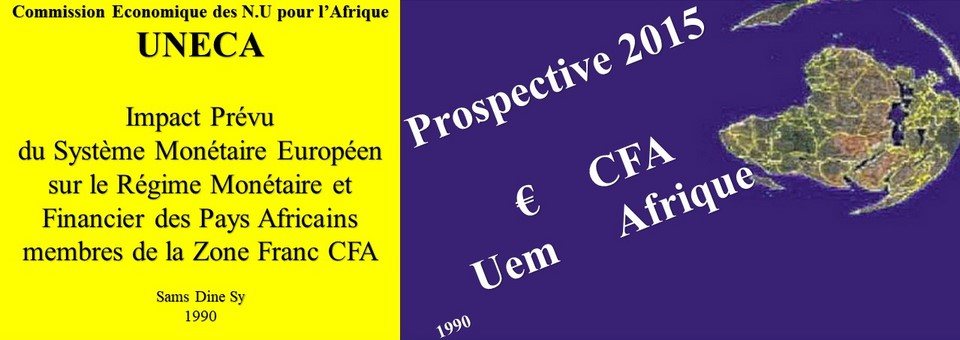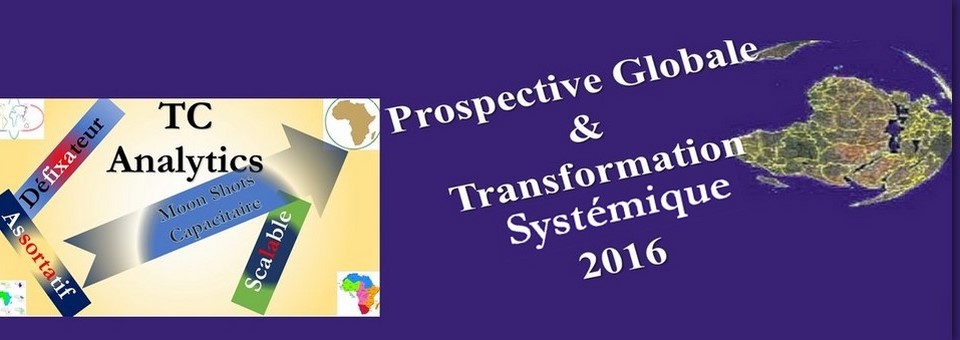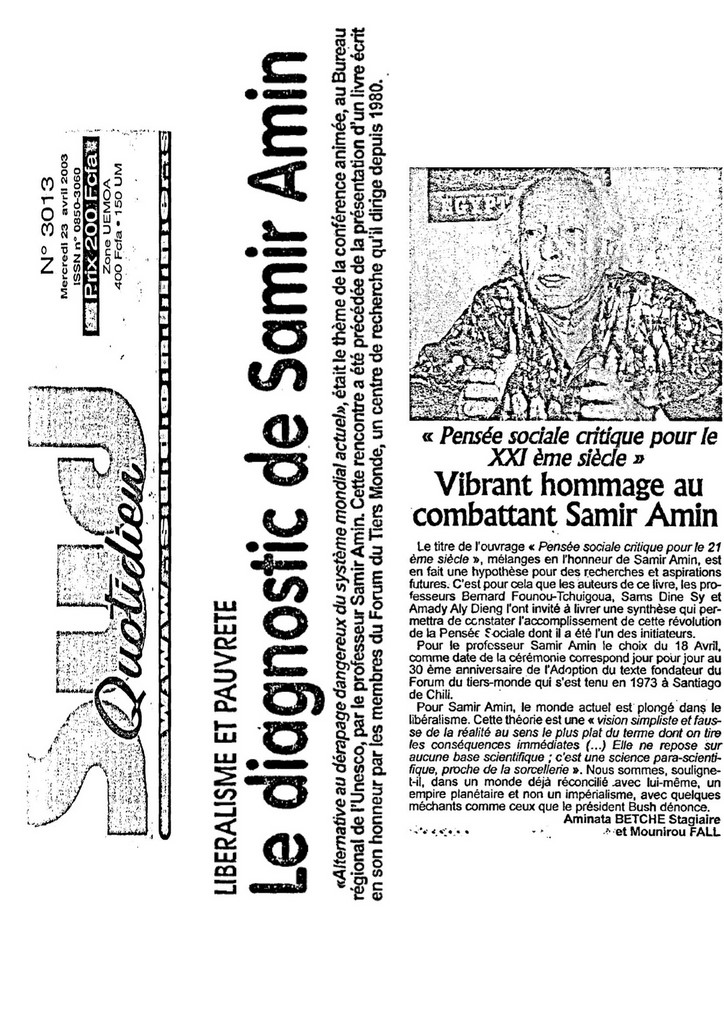POLICY ANALYSIS :
Deployment in Africa
Thinker & Expert
CRITICAL SOCIAL THOUGHT
in
PENSÉE SOCIALE CRITIQUE POUR LE XXIÈ SIÈCLE/
CRITICAL SOCIAL THOUGHT FOR THE XXIST CENTURY
Mélanges en l'honneur de Samir Amin/
Editeurs :
Sams Dine SY e.a
L'Harmattan
ISBN : 2-7475-4111-8 • avril 2003 • 530 pages
Thinker & Expert
Presentation
This book brings together a collection of texts dedicated to Samir Amin's work in order to give an account of his influence in the world. The initiative was taken by members of the Third World Forum, which he has led since 1980 with Bernard Founou, at the Grand Atelier de travail sur la régionalisation, les mouvements sociaux et les partis politiques pour des alternatives à la crise africaine, which took place in Dakar (Senegal) in April 2001 and brought together nearly eighty intellectuals, analysts and leaders of social movements.
Initially, it was decided to take advantage of Samir Amin's seventieth birthday to honour him with a volume of Mélanges that reflects his contribution to the development of an alternative to dominant paradigms in the social sciences, particularly in economics. It took almost a year to gather contributions from his peers and researchers who contributed to the production and dissemination of the major ideas and themes he developed. They reflect the recognition of the African, American, Asian, European and Arab scientific communities, and the profound influence that Samir Amin's work has had on the social sciences worldwide for nearly half a century.
Some concepts he developed or created are in common use in the social sciences today, in the media and even in current language: Eurocentrism and cultural withdrawal, tributary mode of production, unequal development, globalization of value and polarization, really existing capitalism, sovietism, bourgeoisie and comprador state, disconnection and self-centred development, Afro-Asian vocation of Marxism... This prolific author likes to lead networks of critical reflection and participate in the dissemination of his thought both through meetings with scientists in the natural sciences and through participation in events organized by progressive movements throughout the world (see bibliography at the end of this volume).
Mixtures respect different perspectives, historical, local, global; they mix styles, sensibilities, origins and languages; they restore the diversity and complexity of Samir Amin's work; they are a stage - or starting point - for new research, orientations and actions. Political economy remains the dominant discipline, but sociology, political science, history and literature are not left out. A series of texts pays special tribute to Samir Amin, his person and his work. A second series revolves around concepts to the development of which he contributed. Some are oriented towards examining the past and present, others towards the future. The news is not ignored, because several authors try to integrate in their texts the examination of events, crises or initiatives in progress. Of course, his work is appreciated in many ways, as is his public commitment. But there is probably unanimity on a few points.
We have refrained from making clearly separated parts because most texts adopt the multidimensional approach and combine theory, interpretation, analysis and alternative. We have tried to get around this difficulty by giving in this presentation the main themes of the communications.
Samir Amin has always applied open materialism as an approach and socialism as a perspective for humanity. The work of intellectuals must, according to him, be an interaction with social movements whose objective is to initiate transitions towards a world system of post-capitalist societies better for peoples than social-democratic capitalism or sovietism.
The theme of historical materialism is dominant in two texts. While the former introduces the theory of transitional socialist democracy from the failure of sovietism, developmentalism and the impasses of social democracy (Casanova), the latter invites us to a dialogue between Samir and Amilcar Cabral as a contribution to an archaeology of globalized Marxism (B. Founou). Of course, this theme is dealt with in general texts such as those of E . Bictache or G. Massiah or in intellectual biography (A.A Dieng).
For Gustave Massiah, Samir Amin defines himself as a Southern Marxist. Does it matter? A point of view from the South is not only a change of perspective, it is another point of view of the world; it is starting from the blind corner to illuminate and make visible the whole. The Third World is then an analyzer that allows us to take into account and understand the whole world. The relationship between Marxism and the Third World is particularly fruitful. It confirms the universal character of Marxism, in its categories of analysis, as a fundamental method of approach for understanding societies and their transformation.
The criticism of Eurocentrism and ethnocentrism is a constant in Samir Amin's thinking. It is strongly integrated in the analyses of T. Dos Santos, A. Quijano, Yash Tandon. And Catherine Coquery-Vidrovitch invites her French left-wing Africanist historians to abandon European centrism in their discipline and above all to write a rigorous history of French colonization. They should know, she said, that having made a fierce criticism of economicism and neo-classical thought, Samir Amin, thanks to his keen sense of history, is the only economist of the French language (with the exception of Philippe Hugon) whose analyses account for the key factors of African setbacks.
In his intellectual approach, he takes the world system in history as the unit of fundamental analysis and constantly transgresses the boundaries of academic disciplines. Its approach is more dimensional than multidisciplinary. It inspired Mr. Ben Hammouda who, like Sams Dine Sy, learned from him that economists must be open to other fields of knowledge, such as philosophy, political and cultural analysis.
The analysis of the new phase of capitalism really existing as an imperialist system has been retained as the theme of communication by A El Kenz, F.P Nzé-Nguéma, Y Tandon, A Quijano, J.K Sundaram, A Bagchi, A Fadahunsi. Y Tandon criticizes left-wing analysts for not giving the struggles between civilizations the importance they deserve. He seems to share S. Huttington's theses. As for A Quijano, he puts the concept of work/capital ratio at the centre of his analysis. The globalization of the capital-labour relationship is real; it appeared with the colonization of America at the same time as the criterion of races to characterize human groups. It has spread to the rest of the world. It invites to place the work on the formal and informal submission of labour to capital in a global perspective that transcends borders between states. We then discover that, even in the centres, the classic form of salaried employment dominates but does not tend to become exclusive.
We also discover that on a global scale, traditional wage labour has always represented a small minority in the labour force, although it has been the axis around which other relations have been articulated since the beginning of capitalism. From Quijano's analysis flows a theoretical question: what impact would the free movement of labour have on the capital-labour ratio on a global scale? In this context, the analysis of the positions of the Third World and the major powers at the World Conference against Racism, held in Durban in September 2001, receives additional insights (K Mushakoji). Similarly one could read the statistics provided by A. Bedoui on salaried work in Tunisia for forty years in this analytical framework.
The analysis of the American hegemony in the really existing capitalism occupies an essential place at Samir Amin since some years. US control over the major multilateral economic institutions allows them to destabilise the economies of the Third World countries (CA Santos) à la carte. If necessary, by resorting to violence exercised by American services and armies (Fawzy Mansour). I. Wallerstein expresses scepticism about the effectiveness of the U.S. government's counter-terrorism initiatives after the September 11, 2001 attacks. With the anti-terrorist doctrine, Africa's importance increases in the new geo-strategy, while African policy makers still continue to inscribe themselves in visions and strategies inherited from the past (Sams Dine Sy).
Je tiens à vous rassurer tous. Il ne s'agit pas de l'état des lieux d’une œuvre immense, dense et complexe et encore moins l'autopsie d’un cadavre.
Avec ce titre-programme, nous voulons aussi témoigner de ce que tu as réussi, en créant les conditions de la révolution de la pensée sociale critique. Sans doute un travail de Sisyphe. Ce volume rend compte de ta contribution à l'élaboration d’une pensée, d'abord critique puis alternative aux paradigmes dominants dans les sciences sociales.
Personnellement, je me réjouis de faire partie de ceux qui ont décidé d'honorer l'un des derniers hommes livres qu'il nous est encore donné d'approcher, de lire et d'écouter.
Au nom de tous les auteurs qui se sont investi ici, chacun avec son armature conceptuelle, son courage intellectuel et parfois ses tripes, particulièrement au nom de Bernard Founou et de Amady Ali Dieng tes vieux compagnons de route, et aussi à travers moi, au nom de tous ceux qui ont appris ou compris quelque chose en fréquentant ton œuvre,
Je te remets cet exemplaire symbolique en te disant bonne lecture,
Monsieur l'homme livre.
©Sams Dine SY 18 avril 2003
